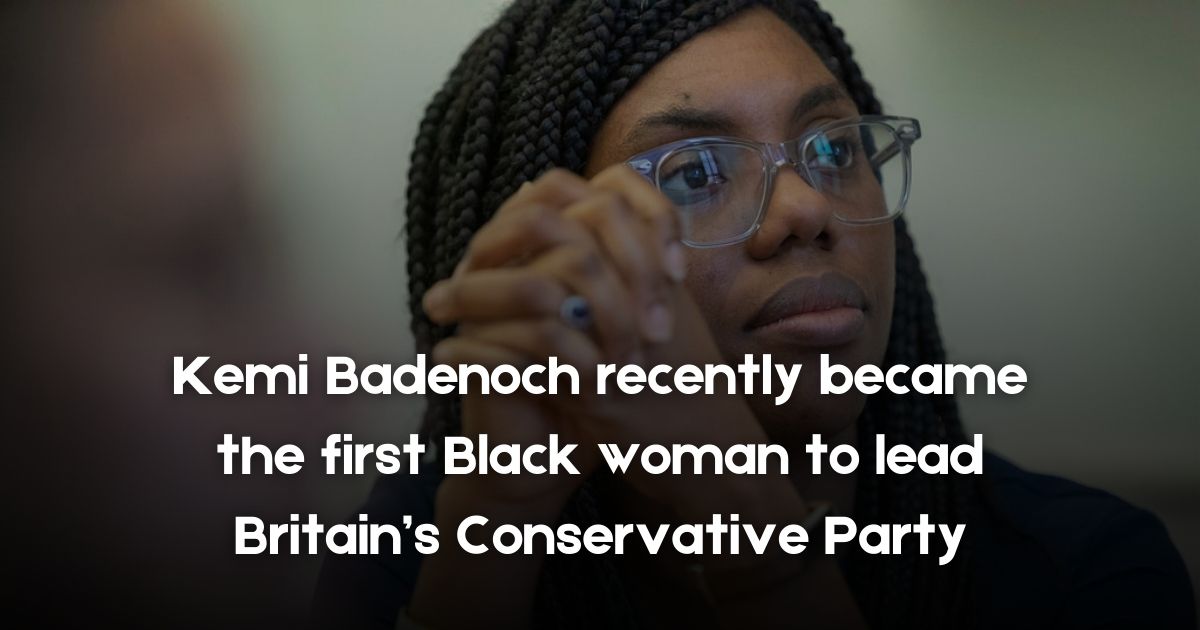
Kemi Badenoch has been making headlines as a significant figure in British politics. She recently became the first Black woman to lead Britain’s Conservative Party, marking an important moment in British political history. Her journey from growing up in Nigeria to leading one of the world’s oldest political parties has been nothing short of remarkable. But who is Kemi Badenoch, and what has led her to this position?
This article will explore Badenoch’s early life, career, political beliefs, and why her leadership is so notable today.
Early Life and Background
Kemi Badenoch was born Olukemi Olufunto Adegoke in 1980 in Wimbledon, London, England. Her family originally came from Nigeria, and she spent parts of her childhood in both Nigeria and the United States. Her parents were educated professionals—her mother a professor of physiology and her father was a doctor. Growing up, Kemi’s family valued education, discipline, and hard work.
When she was a young girl, her family moved back to Nigeria. There, she saw firsthand some of the difficulties that developing countries face, such as unreliable electricity, limited access to healthcare, and political instability. This exposure influenced her deeply, shaping her views on how governments should operate and how individuals can overcome challenges.
After finishing her education in Nigeria, Kemi moved back to the United Kingdom at 16 to pursue higher education. She studied computer systems engineering at the University of Sussex and later earned a law degree, although she eventually chose to pursue a career in politics rather than law.
Career Beginnings and Entry into Politics
Before entering politics, Kemi Badenoch had a career in the private sector. She worked in various technology and banking roles, including a position as a digital director for a major bank. Her background in technology gave her a unique perspective on the importance of innovation and economic growth, topics she would later focus on as a politician.
Badenoch’s interest in politics began with her desire to make a difference in the lives of everyday people. She joined the Conservative Party and, in 2015, ran for a seat in Parliament. Although she was not successful in her first attempt, her persistence and determination paid off. In 2017, she was elected as the Member of Parliament (MP) for Saffron Walden, a historic win as she became one of the few Black women in British Parliament.
Rise Through the Conservative Party
Since her election in 2017, Badenoch quickly gained attention for her intelligence, directness, and fresh approach to politics. She is known for her strong opinions, especially on issues such as free speech, personal responsibility, and education. Her willingness to speak openly about difficult topics helped her stand out in the Conservative Party, and she was soon appointed to various roles within the government.
One of her early roles was as Parliamentary Under-Secretary of State for Children and Families. In this position, she focused on improving education and creating opportunities for young people from all backgrounds. Later, she became Minister for Equalities and Minister of State for Housing, Communities, and Local Government, roles where she advocated for fairness and equal opportunities for everyone in the UK.
In 2022, she was promoted to the role of Secretary of State for International Trade and President of the Board of Trade. Here, she played a key role in shaping Britain’s post-Brexit trade policies and establishing new economic partnerships worldwide. Badenoch’s rise was a testament to her hard work and her commitment to making a difference through the Conservative Party.
Political Beliefs and Views
Kemi Badenoch is known for her conservative views, especially on social and economic issues. She believes in smaller government, free markets, and individual responsibility, which are core principles of the Conservative Party. However, she also brings a unique perspective to her politics due to her background and experiences.
Some of her beliefs include:
- Free Speech: Badenoch is a strong advocate for free speech and often argues against “cancel culture,” the idea that people should be publicly shamed or punished for expressing unpopular opinions. She believes that people should be able to share their views without fear of being silenced or criticized for disagreeing with the majority.
- Equal Opportunity Over Equal Outcomes: Badenoch often talks about the importance of creating equal opportunities rather than forcing equal outcomes. She believes that everyone should have a fair chance to succeed, but that people should be judged based on their abilities and efforts, not on quotas or targets.
- Economic Growth: Badenoch believes in the power of business and entrepreneurship to create jobs and improve lives. She has supported policies that encourage businesses to invest in the UK and has worked on trade agreements to strengthen the UK economy after Brexit.
- Personal Responsibility: She often speaks about the importance of personal responsibility, a core conservative value. Badenoch argues that individuals should be responsible for their actions and decisions and that government should focus on empowering people rather than controlling them.
- Education: Badenoch believes that education is the foundation for a successful society. She supports improving access to quality education and encouraging students to pursue careers in fields that will drive the future economy, such as technology and engineering.
Breaking Barriers as a Black Woman in British Politics
Kemi Badenoch’s leadership in the Conservative Party is historically significant. As a Black woman, she has broken through barriers in a political landscape that has traditionally been dominated by white men. Her rise to leadership not only brings diversity to the Conservative Party but also offers new perspectives that might not have been as prominent in previous leadership.
Badenoch’s background as a Black woman from a working-class family allows her to connect with different communities. She has often spoken about the challenges she has faced, from being stereotyped to dealing with people who doubted her abilities. Her success is inspiring for many people, especially young women and people of color, who may see her as proof that it’s possible to succeed in politics despite barriers.
However, Badenoch’s views are not universally accepted. Some people criticize her conservative approach, especially her views on issues like immigration and welfare. Her focus on personal responsibility and free markets can be controversial, particularly among those who believe that more government support is needed for disadvantaged groups.
Kemi Badenoch’s Vision for Britain
As the leader of the Conservative Party, Badenoch has a clear vision for Britain’s future. She believes in building a society where everyone has the opportunity to succeed, regardless of their background. She aims to strengthen the UK economy, promote individual freedom, and encourage innovation and business growth. Her experience in international trade also suggests that she may focus on making Britain a strong player on the global stage, especially in a post-Brexit world.
Badenoch has also talked about the importance of national pride and unity. She believes that British values like resilience, hard work, and fairness should be celebrated and preserved. While she is proud of her Nigerian heritage, she is also deeply committed to Britain and often speaks about the importance of integration and shared identity.
Challenges Ahead
While Kemi Badenoch has achieved a lot, she faces many challenges as the leader of the Conservative Party. The UK is dealing with complex issues, including economic struggles, healthcare pressures, and social divides. Badenoch will need to address these issues while uniting her party and appealing to a wide range of voters.
Her conservative views may make it difficult to connect with younger and more progressive voters, who often support different policies. Additionally, as the first Black woman to lead the Conservative Party, Badenoch may face pressure from those who expect her to address issues specifically affecting minority communities.
Conclusion
Kemi Badenoch’s journey from a young girl in Nigeria to the leader of Britain’s Conservative Party is inspiring and historic. She has worked hard to reach her position, and her unique perspective brings new ideas to British politics. Badenoch’s focus on free speech, individual responsibility, and economic growth reflects her strong conservative beliefs, which have both supporters and critics.
Whether people agree with her or not, Kemi Badenoch’s role as a leader is significant. She has already made history as the first Black woman to lead the Conservative Party, and her leadership will likely influence Britain’s direction in the years to come. For many, she is a symbol of possibility and proof that hard work and determination can make a difference, regardless of background.






